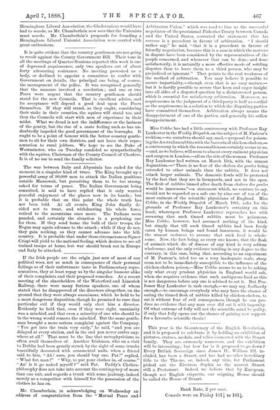Mr. Chamberlain, in acknowledging on Wednesday an address of congratulation
from the "Mutual Peace and Arbitration Union," which was read to him as the successful negotiator of the provisional Fisheries Treaty between Canada and the United States, corrected the statement that his success is a precedent in favour of arbitration. I should rather say," he said, "that it is a precedent in favour of friendly negotiation, because this is a case in which the matters in dispute have been considered by the representatives of the people concerned, and whenever that can be done, and done satisfactorily, it is naturally a more effective mode of settling disputes than to leave them to a third person, who may be prejudiced or ignorant." That points to the real weakness of the method of arbitration. You may believe it possible to secure impartiality,—though even that is no easy matter,— but it is hardly possible to secure that keen and eager insight into all sides of a disputed question by a disinterested person, which is essential for satisfactory arbitration. Moreover, no acquiescence in the judgment of a third party is half as cordial as the acquiescence in a solution to which the disputing parties have committed themselves. Arbitration always means the disappointment of one of the parties, and generally his sullen disappointment.


































 Previous page
Previous page